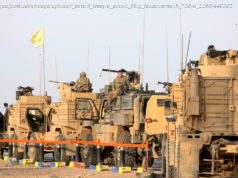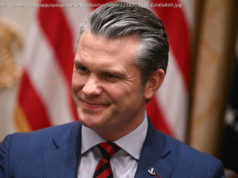This wasn’t supposed to be something we actually had to be afraid of.
In January, I started writing a novel in which a 10-kiloton nuclear bomb was detonated in the center of Washington, where I live. It was meant to be funny. I had read a 2011 report by the Federal Emergency Management Agency that described the effect of such a detonation, and was surprised to learn that my apartment in Adams Morgan would most likely survive the initial blast.
I imagined myself and my neighbors — about half wealthy millennials and half older people who’d bought in before the neighborhood’s property values skyrocketed — sheltering in awkward place in a basement, bickering over scraps of food and someone’s private stash of LaCroix cans.
Then, in April, Kim Jong-un of North Korea released a propaganda video of his army striking the Capitol; over the summer he tested intercontinental ballistic missiles that may be capable of striking the East Coast. More recently, President Trump called Mr. Kim “short and fat,” and now, apparently, North Korea has sentenced Mr. Trump to death in absentia. Suddenly, my novel started feeling a lot less funny.
For 1980s babies like me, nuclear war has long had a darkly comic edge. Too young to have experienced 1950s school drills or to remember the heightened anxieties of the early 1980s, we’ve viewed nuclear war as a terrifying improbability, especially compared with the terrifying certainties that we know all too well: global warming, terrorism, lone-wolf gunmen. America is in the privileged position of having inflicted nuclear casualties, not suffered them — and since the Cold War ended, it’s felt relatively likely that we wouldn’t be on either side of that equation again.
Understanding nuclear war from movies, books and grainy videos of kids hiding ineffectually under desks, we’ve seen it mostly through two prisms: black humor and camp. On the camp side, there’s the 1983 movie “The Day After,” with an Urkel-jeaned Steve Guttenberg and all the flashing skeletons. On the black humor side, everything from “Dr. Strangelove” to Kurt Vonnegut to the work of Takashi Murakami, as Spencer Weart points out in his book “The Rise of Nuclear Fear.”
Humor requires distance — we’ve been living in a constantly refreshed state of “too soon” for jokes about school shooters ever since I graduated from high school, two months after the Columbine attack. The psychologists Peter McGraw and Caleb Warren have developed a framework called “benign violation theory” to describe events that lend themselves best to humor: a violation or a threat, but one from which the joker is somewhat removed. It’s unclear exactly how much distance we need to laugh about something as cataclysmic as nuclear attack.
Spencer Weart believes that the black humor of the ’60s was actually occasioned by proximity — a nervous proximity that forced nervous laughter. While “nobody was making jokes during the Cuban missile crisis,” Dr. Weart said, writers and artists in the years after used morbid satire to express their inexpressible panic. “Thoughts of nuclear war were repressed because they were so terrible, and it came out in humor,” he told me.
Since the end of the Cold War, he points out, the instinct to humorize nuclear war has diminished along with the threat. More recent dystopian and nuclear fiction, from “The Hunger Games” to Cormac McCarthy’s “The Road” to “Mad Max: Fury Road,” have mostly been intensely serious. (There are exceptions: the running gags on “South Park” about Korean leaders with terrible haircuts, for instance.) Although “Saturday Night Live” and other late-night shows still mock Kim Jong-un (“the Harry Styles of North Korea,” as the Weekend Update host Colin Jost called him in April), there hasn’t been the flowering of gallows humor that we saw during the early days of the Cold War. Dr. Weart believes that the relative lack of specific threat over the past decade has encouraged a more serious approach: “You don’t have the visceral terror and therefore, you don’t have that reaction of laughing.”
This theory is borne out by the response of a nation that earns its visceral terror far more than anyone in America: South Korea. According to Haeryun Kang, a South Korean journalist, South Koreans tend to be somewhat blasé about the threats from their northern neighbor, either because of denial or sheer habituation. But they also have a “vibrant culture” of joking about it, creating meme-like “parody posters” showing, for instance, Kim Jong-un on a barbecue. “Laughing about something is one of the more accessible ways to approach a difficult issue,” Ms. Kang said by email.
For me, an increase in visceral terror over the past year at first made me need to laugh, and then made laughing feel inappropriate. When I started my nuclear-attack novel, I felt I was using humor to assuage my latent fears of an attack; it felt cathartic. But catharsis, like humor, implies a remove: You’re re-experiencing a past trauma, or inhabiting someone else’s. As it became increasingly plausible that I could live through the precise situation I was describing, the humor faded, and I abandoned the project.
Should we actually approach the brink of nuclear war, humor might feel necessary again. And if it does, I have a novel all ready to go.






